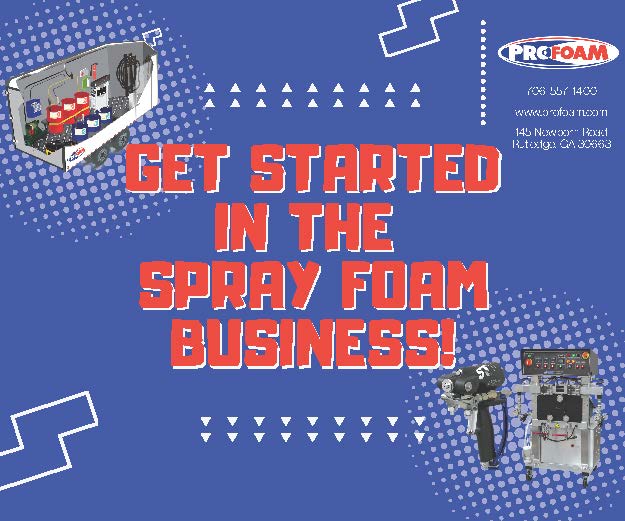
Spray Polyurethane Foam Insulation in Commercial Projects

In the realm of commercial construction, where energy efficiency, sustainability, and cost-effectiveness are paramount concerns, spray polyurethane foam (SPF) insulation has emerged as a versatile and innovative solution.
Spray foam insulation has become instrumental in achieving energy efficiency and meeting performance standards across a broad spectrum of commercial and industrial structures. As a high-performance foam plastic insulation, spray polyurethane foam is meticulously crafted to comply with building codes and stringent performance criteria governing the commercial building envelope.
Medium-density (2 lb) closed-cell spray foam insulation is aptly employed in both exterior and interior surface applications, offering robust insulation properties. On the other hand, low-density (1/2 lb) open-cell spray foam insulation products are well-suited for interior surface applications, providing excellent insulation with a lighter density. These versatile spray foam insulation types find applicability across various building categories, including institutional, educational, healthcare, retail, commercial, and military installations, among others.
Let's explore the advantages of SPF insulation in commercial projects and examine some common applications across various industries.
The Benefits of Spray Polyurethane Foam Insulation
Superior Thermal Performance
SPF insulation provides outstanding thermal resistance, effectively minimizing heat transfer and reducing energy consumption in commercial buildings. By creating a continuous, seamless barrier that seals gaps and cracks, SPF insulation helps maintain consistent indoor temperatures year-round, enhancing occupant comfort and reducing heating and cooling costs.
Air Sealing and Moisture Control
One of the key advantages of SPF insulation is its ability to act as an air barrier, preventing air leakage and infiltration in commercial structures. This air-sealing property not only enhances energy efficiency but also mitigates the risk of moisture intrusion, condensation, and mold growth, preserving indoor air quality and structural integrity.
Versatility and Adaptability
SPF insulation is highly versatile and can be applied to a wide range of substrates and surfaces in commercial buildings. From roofs and walls to ceilings and floors, SPF insulation conforms to irregular shapes and contours, providing complete coverage and insulation integrity. Its compatibility with various construction materials makes it suitable for both new construction and retrofit projects.
Sustainability and Environmental Impact
In today's environmentally conscious society, sustainability is a driving force in commercial construction. SPF insulation supports green building initiatives by reducing energy consumption, lowering greenhouse gas emissions, and minimizing the environmental footprint of buildings. Its long lifespan, durability, and energy-saving benefits contribute to LEED certification and other sustainability goals.
Common Applications of SPF Insulation in Commercial Projects
Roofing Systems
SPF insulation is widely used in commercial roofing applications due to its seamless, monolithic nature and superior waterproofing properties. Spray foam roofing systems create a durable, weather-resistant barrier that protects buildings from water intrusion, UV radiation, and thermal fluctuations. They are ideal for flat or low-slope roofs and can be applied directly over existing roofing materials.
HVAC Ductwork Insulation
SPF insulation is used to insulate HVAC ductwork in commercial buildings, improving energy efficiency and thermal comfort. By reducing heat loss or gain in duct systems, SPF insulation helps optimize HVAC performance, minimize energy waste, and maintain consistent indoor temperatures throughout the building.
Metal Buildings
Spray foam insulation offers valuable solutions for enhancing the performance and comfort of metal buildings. By providing superior thermal insulation, moisture control, and air sealing, spray foam helps regulate temperatures and prevent energy loss in metal structures such as warehouses, hangars, and agricultural buildings. Its ability to conform to irregular surfaces and fill gaps ensures complete coverage and insulation integrity. Additionally, spray foam insulation reinforces the structural integrity of metal buildings, reducing noise transmission and improving occupant comfort. Overall, spray foam insulation plays a crucial role in maximizing energy efficiency, durability, and sustainability in metal building applications.
Masonry Buildings
Spray foam insulation finds versatile applications in masonry buildings, offering solutions for both insulation and moisture control. When applied to masonry surfaces, spray foam provides excellent thermal insulation, reducing heat transfer and enhancing energy efficiency. Additionally, spray foam's ability to seal gaps and cracks helps prevent air infiltration and moisture intrusion, safeguarding the structural integrity of masonry walls. Whether used in new construction or renovation projects, spray foam insulation effectively enhances the comfort, durability, and sustainability of masonry buildings.
Agricultural & Industrial Applications
Spray foam insulation plays a crucial role in enhancing the efficiency and sustainability of agricultural and industrial buildings. Its versatile applications include providing superior thermal insulation, moisture control, and air sealing. In agricultural settings, spray foam insulation helps regulate temperatures within livestock buildings, storage facilities, and greenhouses, ensuring optimal conditions for crops and animals.
In industrial buildings such as warehouses, manufacturing plants, and processing facilities, spray foam insulation improves energy efficiency, protects equipment from temperature fluctuations, and enhances overall operational efficiency. By creating a durable, airtight barrier, spray foam insulation contributes to cost savings, environmental sustainability, and the longevity of agricultural and industrial structures.
Cold Storage Facilities:
SPF insulation is an excellent choice for cold storage facilities and refrigerated warehouses due to its superior thermal performance and moisture resistance. Spray foam insulation creates a tight thermal envelope that helps maintain consistent temperatures and humidity levels, preserving the quality and freshness of perishable goods while minimizing energy costs.
Conclusion
Spray polyurethane foam insulation offers commercial builders and property owners a versatile, cost-effective, and sustainable solution for enhancing energy efficiency, thermal comfort, and structural integrity in commercial projects. With its superior thermal performance, air-sealing capabilities, and adaptability to diverse applications, SPF insulation plays a vital role in optimizing building performance, reducing operating costs, and promoting environmental stewardship. Whether used in roofing systems, wall assemblies, HVAC ductwork, or industrial facilities, SPF insulation delivers long-lasting benefits that contribute to the success and sustainability of commercial buildings across various industries.






